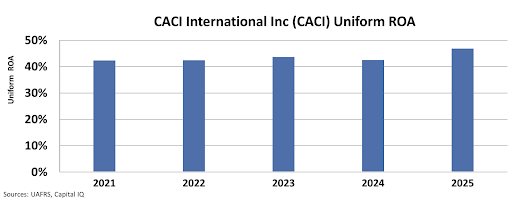The Big “Five” defense firms aren’t the only companies who will benefit from increased military spending

Rising global tensions is forcing the U.S. to reinvest heavily into its military so its defense and intelligence capabilities can keep up with today’s volatile geopolitical environment.
That’s why instead of budget cuts, the Trump Administration increased the defense budget by 13%, pushing military spending over the $1 trillion threshold for the first time ever.
This funding windfall will benefit major defense firms like Lockheed Martin (LMT) and Boeing (BA), but it will benefit smaller, yet crucial companies like CACI International (CACI) as well.
This provider of mission-critical IT systems has delivered returns of 40%+ since 2021. Last year, it generated 47% in returns together with a Uniform asset growth of 14%. However, it currently trades at just 17x Uniform P/E, well below corporate averages.
Investor Essentials Daily:
Tuesday News-based Update
Powered by Valens Research
Rising global tensions is intensifying demand for military hardware and other mission-critical systems needed in the smooth operation of military bases and installations and other security- and intelligence-related activities.
As mentioned in yesterday’s article, the U.S. is reinvesting heavily in the defense industry as the administration has made its stance on defense clear: America will invest in new military technologies to keep up with an evolving world.
That’s why instead of budget cuts, the Trump administration increased the defense budget by 13%, pushing the military defense spending over the $1 trillion mark for the first time ever.
This windfall in funding is set to benefit the “Big Five” defense firms composed of Lockheed Martin (LMT), Boeing (BA), RTX (RTX), General Dynamics (GD), and Northrop Grumman (NOC).
However, those aren’t the only firms in the defense industry that’s going to benefit from increased military spending.
Other companies like CACI International (CACI) are well-positioned to capitalize on increased defense expenditure as well.
The information technology (“IT”) company is a supplier of mission-critical systems for the U.S. government’s defense and intelligence agencies.
At present, CACI International provides services which include data analytics, network modernization, enterprise IT, electronic warfare, cybersecurity, and other mission-critical systems and software needed crucial to land, sea, and space operations.
Aside from those segments, the defense firm offers indefinite delivery/indefinite quantity (“ID/IQ”) to various federal and state government agencies.
Recently, the company bagged a couple of five-year contracts from U.S. defense agencies. In September, it secured a task order—valued at around $180 million—to deliver secure network operations in the Pacific theater of operations for the Air Force.
Subsequently, in October, a contract worth $73 million was signed to continue the modernization of the Air Force’s network for transmitting intelligence across air, ground, and space for the Department of Defense.
CACI International also announced that its backlog went up 4% year-over-year to $34 billion during the first quarter of its 2026 fiscal year.
Due to the breadth of its offerings and its ability to secure contracts from America’s intelligence and security agencies, the company has maintained returns above 40% since 2021.
This year, CACI International delivered a Uniform return on assets (“ROA”) of 47% and achieved a Uniform asset growth of 14%.
Despite its strong performance and ability to generate steady returns, the company trades a Uniform P/E of 17x, below corporate averages.
This valuation suggests that the market is currently concerned about contract timing and political uncertainty surrounding government spending.
However, as pointed out earlier in this article, the government has committed to prioritizing defense spending, which has likewise led to a higher backlog for the defense firm.
CACI International’s focus on cybersecurity, electronic warfare, and analytics gives it a long runway for growth as America continues to prioritize—and modernize—its defense capabilities in response to ongoing geopolitical tensions.
Best regards,
Joel Litman & Rob Spivey
Chief Investment Officer &
Director of Research
at Valens Research

